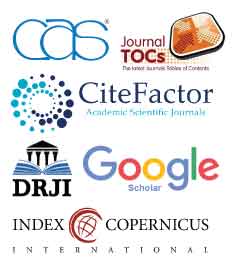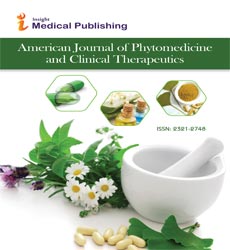ISSN : 2321-2748
American Journal of Phytomedicine and Clinical Therapeutics
Medical Interest in the Use of Herbal Supplements and Nutraceuticals
Ravi Kumar*
Department of Pharmaceutical Chemistry, Rasiklal M. Dhariwal Institute of Pharmaceutical Education and Research, Pune, India
- *Corresponding Author:
- Ravi Kumar
Department of Pharmaceutical Chemistry, Rasiklal M. Dhariwal Institute of Pharmaceutical Education and Research, Pune, India
E-mail: Rk45556@ymail.com
Received date: December 30, 2022, Manuscript No. IPAPCT-23-15877; Editor assigned date: January 02, 2023, PreQC No. IPAPCT-23-15877 (PQ); Reviewed date: January 14, 2023, QC No. IPAPCT-23-15877; Revised date: January 24, 2023, Manuscript No. IPAPCT-23-15877 (R); Published date: January 30, 2023, DOI: 10.36648/2321-2748.11.1.172
Citation: Kumar D (2023) Medical Interest in the Use of Herbal Supplements and Nutraceuticals. Am J Phytomed Clin Ther Vol.11.No.1:172
Description
Medicinal plants have been applied for sicknesses from time immemorial to the present. A few studies have reported the efficiency of herbs including Apium graveolens in noteworthy decreasing anxiety and depression. Some researchers also showed celery efficiency to control diabetes, serum lipid, blood pressure (BP), and cardiovascular disease. Treatment with celery improved behavioral changes and oxidative stress parameters. Celery seeds contain several active ingredients such as phthalides, luteolin, d-limonene, apigenin, and linalool. Ye et al. have shown that 3-n-butylphthalide (NBP) is the main component of celery seed extract. They presented that NBP could improve brain-derived neurotropic and transcription of neuroprotective factors.
Herbal Supplements
It seems NBP had a significant effect to decrease bad cholesterol and also control stress hormones which raise BP. Anxiety and depression are crucial public health issues, affecting the rising in hospitalizations and death. Many health problems mainly psychiatric ones are affected by anxiety. Another common psychiatric disorder is depression. Fifteen percent of people have experienced depression in their lifetime worldwide. Due to many depressed people who are also diagnosed with anxiety, it seems anxiety and depressions are closely correlated. There are several medications to cure and control anxiety including benzodiazepines, β-blockers, and cognitive-behavioral treatment. There are not any fundamental improvements to cure anxiety in recent decades. More studies are needed to assess the potency and safety of anti-anxiety medications as well. Due to the adverse effects and risks associated with the use of synthetic medicine, there is a great deal of popular and medical interest in the use of herbal supplements and nutraceuticals to manage psychiatric problems. Currently, there are a few formulations of natural compounds and extracts available which can be used to cope with psychiatric disorders. Moreover, a number of studies have presented herbal supplementary medicines to control mental disorders such as anxiety and depression.
Cardiovascular Risk
Besides, different tools have been applied to assess anxiety and depression. The most reliable and touchable tests are the Beck anxiety inventory (BAI) and Beck depression inventory (BDI-II). BAI is a famous self-evaluation assessment instrument of anxiety for clinical studies. BAI questionnaire expressed four characteristics of anxiety symptoms including subjective, neurophysiologic, autonomic, or panic-related. BDI is also an international self-evaluation assessment instrument for depression. Two subdivisions cover all items of the BDI questionnaire which are somatic and cognitive-affective symptoms. Some studies have reported a two-sided adhesion of anxiety and hypertension (HTN). The correlation between HTN and depression is also designated in a review article. Subsequently, antihypertensive medicine with positive psychological agents seems to perform an excellent effect on hypertensive patients with anxiety. Mental disorders such as anxiety can worsen BP problems. The cardiovascular risk could be increased due to changes in the circadian rhythm of BP. Investigating the role of anxiety on the circadian rhythm of BP will offer a more objective basis for the correlation between anxiety, HTN, and cardiovascular diseases. The present study is a triple-blind, placebo-controlled, cross-over clinical trial aimed to evaluate the effects of celery seed extract as a drug supplementary on mental problems primary in anxiety and secondary in depression in hypertensive patients. The psychometric properties of anxiety and depression were investigated and the results were promising. The inclusion criteria were age range of 20-70 years old, ability to understand the process of the study, completion of the consent form, systolic blood pressure (SBP) between 120 and 160 mmHg, or diastolic blood pressure (DBP) between 80 and 100 mmHg, BAI severity from mild to severe (score: 8-63). On the other hand, the exclusion criteria were pregnancy or breastfeeding, infectious and inflammatory diseases, fever, allergic symptoms, alcohol consumption, or any intolerable side effects. Moreover, other exclusion criteria included a history of psychosis or bipolar disorder, significant suicidal ideation in the previous 6 months, kidney disease, diagnosed hepatobiliary disease or inflammation, use of conventional antidepressants, regular benzodiazepine or opiate use in the previous month, previous adverse reaction to celery, concurrent counseling or psychological therapy.

Open Access Journals
- Aquaculture & Veterinary Science
- Chemistry & Chemical Sciences
- Clinical Sciences
- Engineering
- General Science
- Genetics & Molecular Biology
- Health Care & Nursing
- Immunology & Microbiology
- Materials Science
- Mathematics & Physics
- Medical Sciences
- Neurology & Psychiatry
- Oncology & Cancer Science
- Pharmaceutical Sciences
